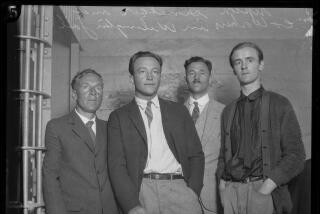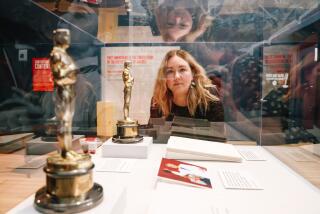Alvah Bessie, Blacklisted by Studios, Dies
- Share via
Alvah Bessie, a writer whose politics took him to Spain to fight in the Abraham Lincoln Brigade during the Spanish Civil War and years later to Washington, where he refused to tell the House Un-American Activities Committee if he had ever been a Communist, is dead.
His death Sunday in the San Francisco suburb of Terra Linda leaves only three of the original “Hollywood 10” still alive.
Bessie, who was 81 when he died after a heart attack, was found guilty of contempt of Congress in 1950 after telling the committee three years earlier, “I will never aid or abet such a committee in its patent attempt to foster the sort of intimidation and terror that is the inevitable precursor of a fascist regime.”
His defiance, which he based on constitutional rather than political grounds, cost him a $1,000 fine and a year in prison. Sentenced with him were then-successful film writers and directors like Ring Lardner Jr., Albert Maltz, Samuel Ornitz, Adrian Scott, Dalton Trumbo, Herbert Bieberman, John Howard Lawson, Lester Cole and Edward Dmytryk. Only Cole, Lardner and Dmytryk now survive.
Beyond the sentence at the federal prison in Texarkana, Tex., was the film studio’s blacklisting that kept Bessie and the others from working for years. In Bessie’s case, it marked the end of his American film career.
“I was thrown out of Hollywood on my ass, and I’ve been involved in a struggle to stay alive ever since,” Bessie said in a 1977 interview. “People say it’s now pretty fashionable to say you were blacklisted, but if it’s that fashionable, I haven’t gotten any offers from Hollywood yet.”
Bessie’s book, “Inquisition in Eden,” is an account of his struggles as a blacklisted writer.
Under Contract to Warner
Before his testimony before the House Un-American Activities Committee, Bessie had been under contract to Warner Brothers where he wrote such films as “Northern Pursuit,” “The Very Thought of You,” “Objective Burma!” and “Hotel Berlin.”
The son of a New York City businessman, Bessie attended Columbia University and then joined with workers trying to organize unions in the early 1930s. As a critic for the Brooklyn Eagle, he helped set up the American Newspaper Guild.
The Great Depression helped radicalize his views. After interviewing Andre Malraux who was in the United States to raise money for the Spanish resistance, Bessie left the country to fight against the forces of Francisco Franco.
Account of Spanish War
“Men in Battle” is Bessie’s account of the Spanish Civil War. At his death, said his longtime friend, writer Peter Carroll, he was working on an anthology about that war.
Bessie’s first novel, “Dwell in the Wilderness,” was written while he lived in Vermont and before becoming a unionist.
His other books include “The Un-Americans,” a further account of his travails with the government; “Spain Again”; “Alvah Bessie’s Short Fictions,” and “Bread and a Stone,” a study of a young American in conflict with his environment. In 1966 he wrote “The Symbol,” a novel about film star Wanda Oliver, who in reality was Marilyn Monroe. It was made into a television movie.
After the blacklist, he came to San Francisco and edited a union newspaper for Harry Bridges, head of the International Longshoremen’s and Warehousemen’s Union.
Another of his works, “One for My Baby,” is a thinly veiled account of his seven years at San Francisco’s Hungry i, a nightclub where he worked as a $70-a-week stage manager and soundman during the blacklist period.
Bessie is survived by his wife, Sylviane; sons, Daniel of Santa Cruz and David of Tiburon, and daughter, Eva Wilson of Aurora, Mo.
More to Read
Only good movies
Get the Indie Focus newsletter, Mark Olsen's weekly guide to the world of cinema.
You may occasionally receive promotional content from the Los Angeles Times.










